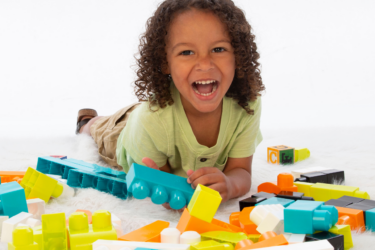
Taking Back Summer: The Benefits of Being Bored
Thinking back on the summers of my childhood, I remember that the days were long and hot with one day running into the next. My circle of friends were the neighborhood kids. The pace was slow, but our bicycles were fast, and we rode them everywhere. I remember the cool wind against our sweaty faces as we rode. We knew all the shortcuts and back roads to the K&B. Our neighborhood was our world, and we felt free. I remember the feel of the grass on our bare feet as we searched for four-leaf clovers and made crowns with flowers. I remember creating caterpillar circuses with tiny bubble wands. They became hoops for the caterpillars to crawl through while performing death-defying acts as they landed in a tiny cup of water. When it got too hot, we would create synchronized swimming dance routines in the pool with grand performances for our parents. The greatest show on Earth was often found in our backyards. I remember that it all felt perfect, and it all happened, because we were bored. What will our children remember from their childhood summers?
Whether it is to provide an activity while you are at work, or because you want your children to be enriched during the summer, as parents we often try to “fill” our children’s summers with events. From summer camps to sporting activities, we keep our kids busy! Despite these efforts, you’re still bound to hear the phrase, “Mom, Dad…I’m bored.” Before you jump into problem-solving parent mode, consider this, it might actually be beneficial for your children to be bored.
Boredom lets them get used to alone time
Boredom allows children to become comfortable with being alone with their thoughts. Child and Adolescent Psychiatrist Dr. Megan Thompson says, “I have found in my practice that parents will have their children engaged in numerous activities in an effort to shape them into well-rounded individuals and provide them with stimulating lives. While this may be well-intended, when children do not have time to themselves to sit with their own thoughts, it can become so uncomfortable to them that they don’t know how to not be busy. As they mature and enter college and adulthood, when they do have down-time or alone time, it often becomes anxiety provoking, so they may even continue to keep an overly busy schedule to avoid this.”
Boredom removes the tether to technology
Children today are so used to “screen entertainment” from cell phones and iPads to televisions and video games, that they are rarely presented with the opportunity to experience boredom. Mental health therapist Johanna Martinez-Rink says, “I think it is so important to allow children to find ways to entertain themselves such as going outside, drawing, and reading, instead of us trying to fill that boredom with toys or technology.” We empower our children by giving them the space to develop emotional self-control by letting go of our own feelings that we need to keep them constantly entertained. Rink also offers this important reminder, “Lead by example. Try not to constantly check emails, texts, and social media. If you can’t put your own phone down at the risk of feeling mentally bored or not stimulated, then that is a problem. It may be challenging for us as parents, but we have to be aware of our own behaviors and the example that they are setting for our children.”
Boredom breeds imagination
Denham Springs mom Jeanne Belleau Bordelon says the most frustrating part of planning summers as a parent is that, “We work so hard to plan activities, and we put so much of a burden on ourselves as parents, but then we lose sight of what the original goal was in the first place—to make summer fun. When that happens, ultimately, the kids are worn out. I’ve learned that when you give them more unstructured time, this enables them to use their imaginations.” One suggestion to help parents let go, and put the responsibility back on your child, is to sit down with them at the beginning of the summer and make a list of all the things they want to do this summer. This list can include basic items like reading a book or riding a bike, but could also include more “creative” ideas like writing a poem or planning a scavenger hunt. Put this list somewhere handy, and when your child has nothing to do, send him back to this list of ideas.
Dr. Thompson says these creative moments inspired by boredom will become your child’s most treasured summer memories. She says, “I can recall a child telling me last year that his favorite part of the summer was the week that he did not have any camps and he ended up building a fort in his backyard with various household items. The smile on his face when he described this scene was amazing, and you could tell how proud he was of himself.”
Boredom helps children find out who they are
When we provide our child this space of unstructured time, he will gravitate to his own interests. Ask any adult to recall their childhood. Writers may recall keeping diaries or books of poetry, and musicians may remember putting on “concerts” for their families. Your children may not realize it at the time, but this downtime is beneficial to helping them find their identities. Dr. Thompson recalls an adolescent who started a small dog-walking business among neighbors last summer, and now he is brainstorming new entrepreneurial ideas for this summer, and is already thinking about studying business in college, which is several years ahead of him. This time gives children the freedom to explore and to be themselves, and helps them find their places in the world.
Maybe this reminder can apply to all of us. Give yourself permission to slow down with your kids and do nothing from time to time. And if you hear the phrase, “I’m bored,” remember that boredom comes just before the magic of summer happens. ■





